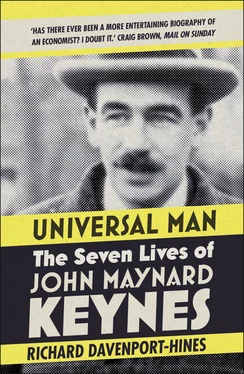Keynes was a prolific contributor to daily newspapers, weekly magazines and learned journals. These articles were intended to have immediate influence on decisions, and to alter short-term opinion. There was immediacy, responsiveness and topicality in them: though his journalism was ephemeral, its persuasiveness was enduring. Keynes’s books, by contrast, were meant to be re-read. They defined first principles, characterized problems, posed questions, established models and raised implications of enduring purpose. Their eloquence was meant to be persuasive beyond time. The most famous of them, The Economic Consequences of the Peace , which was published over ninety years ago, still resonates. In it Keynes addressed what he called the ‘unusual, unstable, complicated, unreliable, temporary nature of [Europe’s] economic organization’. Western economies, he emphasized, depended on ‘the inequality of the distribution of wealth’. He identified the beginning of an aggressive, democratized new consumerism – ‘the war has disclosed the possibility of consumption to all, and the vanity of abstinence to many’ – and predicted that once ‘the bluff is discovered, the labouring classes may no longer be willing to forgo so largely’. In consequence, the middle classes’ conspicuous new consumption might provoke confiscatory tax regimes and political revenge.7
In the classical world – and classical training was instilled in Keynes by his education – the predominant question for thinking people was: ‘How may I lead the Good Life?’ After the religious wars of the seventeenth century had been fought to exhaustion, Europeans addressed the purpose of life with a different question: ‘What must I do to be saved?’ Keynes tried to answer these questions for Economic Man. In a review of The Economic Consequences of the Peace in 1920, Dennis Robertson, who knew Keynes well, wrote that he favoured ‘hope against despair – of taking, where the future is at best uncertain, the risks of generosity rather than the risks of meanness. Perhaps – perhaps Mr Keynes himself is a bit of an old theologian, after all; and not a bad thing to be, either.’8
‘It seems clearer every day’, Keynes wrote in 1925,
that the moral problem of our age is concerned with the love of money, with the habitual appeal to the money motive in nine-tenths of the activities of life, with the universal striving after individual economic security as the prime object of endeavour, with the social approbation of money as the measure of constructive success, and with the social appeal to the hoarding instinct as the necessary provision for the family and for the future. The decaying religions around us, which have less and less interest for most people unless it be an agreeable form of magical ceremonial or of social observance, have lost their moral significance … just because they do not touch in the least degree on these essential matters.
These attitudes to both money-making and religion set him at odds with many Americans in his lifetime and nowadays. Moreover, in both his private and official correspondence, he made sharp criticisms of American working methods and government organizations. However, he was not anti-American. There was no animosity in his remarks. His misgivings about the American way were expressed with the frankness with which he spoke of the misjudgements or inadequacies of the Bank of England, Eton College, the rump of Liberal party leaders after Asquith, the star columnists of the New Statesman , the Scottish members of the Arts Council of Great Britain. Hostility to the richest nation in the world would have seemed to him stupid, purblind, defeatist and regressive. The energy and optimism of the United States delighted him.9
Pessimism was an abomination to Keynes. He detested stupidity as a form of ugliness, and fought ignorance as the cause of pessimism, inhumanity, injustice and wastage. Humankind lived with some solid knowledge, an ungovernable welter of fragmentary information, a host of assumptions and many improvisational, day-to-day solutions. Keynes used both logic and instinct – adduced both neutral data and creative imagination – in order to make these cohere into clearer precepts for living. The motive force of his life was that, if only human stupidity could be overcome, and pessimism eradicated, most of the world’s evils were remediable.
Keynes was a man of joyous vitality. At times he was too optimistic – so ardent was his faith in the power of reason and persuasion (especially his own). Always he was the centre of vigorous, disciplined activity. He believed that all problems were soluble in principle by rational thought – though obtuseness could prevent the solution being enacted. His method was first to identify the intellectual solution; then to devise an administrative technique to apply that solution; and finally to persuade others of the sense of his recommendations. He was a gregarious intellectual, who relied on the stimulus of fast, incisive discussion with his friends and protégés, although his constructive planning was detailed, methodical and sure. T. S. Eliot and other contemporaries extolled the concision, lucidity, word-perfect vocabulary and irony of his prose.
Not everyone liked Keynes. He was the model for a shifty stockbroker called Joseph Barralty in John Buchan’s novel The Island of Sheep (1936): Buchan had ample chance to study Keynes, as they were fellow members of the Other Club, and dined together at the Savoy Hotel for a dozen years. ‘Tallish, lean, big-nose, high cheekbones,’ an official from Scotland Yard says of Barralty. ‘He has a moustache which has gone grey at the tips, and it gives him a queer look of innocence. That’s one aspect – the English country gentleman. In another light he is simply Don Quixote – the same unfinished face, the same mild sad eyes and the general air of being lost that one associates with the Don. That sounds rather attractive, doesn’t it? – half adventurer, half squire? But there’s a third light – for I have seen him look as ugly as sin. The pale eyes became mean and shallow and hard … and the brindled moustache with its white points looked like the tusks of an obscene boar.’ Worst still, ‘he’s a first-class, six-cylindered, copper-bottomed highbrow. A gentlemanly Communist. An intellectual who doesn’t forget to shave. The patron of every new fad in painting and sculpting and writing. Mighty condescending about all that ordinary chaps like you and me like, but liable to enthuse about monstrosities, provided that they’re brand new and for preference foreign.’ What made the Scotland Yard man long to finger Barralty’s collar was his condescension: ‘His line is not the fanatic, but the superior critic of human follies.’10
Intelligence cuts its way through conventions, beliefs, dogmas, traditions, sentiments, and social codes as an engineer hacks his way through forests and mountains, surmounts outcrops of nature, opening them up or slicing them away, forging ahead and imposing the shortest path. ‘The mind of Maynard Keynes was an extraordinary instrument, powerful, subtle, swift and penetrating,’ wrote Kingsley Martin, who worked with him for the last fifteen years of his life. ‘It was silly to try to argue with it; you could only change his conclusion by offering a new premise. He could – and did – do most things better than anyone else.’ Keynes reached rapid conclusions, and revised them just as swiftly. His reputed inconsistency ‘was nothing of the sort; it was merely the mental gymnastics proper to a King’s don’, judged Martin (referring to the Cambridge college of which Keynes was a member for over forty years). ‘He was willing to try any workable expedient.’11
Among those who only knew him socially, and had no working connection with him, Keynes was less intimidating. ‘Maynard was the cleverest man I have ever known,’ the art critic Clive Bell remembered. ‘His cleverness was of a kind, gay and whimsical and civilized, which made his conversation a joy to every intelligent person who knew him. In addition he had been blest with a deeply affectionate nature.’ Bell, in truth, was ambivalent about Keynes’s worldliness, but acknowledged that ‘he was magnificently generous: generous to his country, generous to his college … generous to his less fortunate friends’.12
Читать дальше












